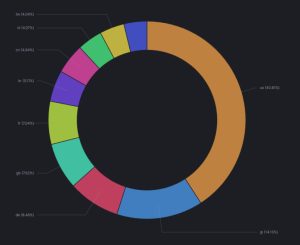One tech company is harnessing artificial intelligence, thermal imaging, and real-time surveillance data to mitigate the spread of the coronavirus. However, serious privacy questions remain.
As the coronavirus pandemic continues to take its toll on populations and economies around the globe, governments and private industries are harnessing real-time monitoring solutions and artificial intelligence to mitigate the spread. However, these surveillance technologies also bring up a litany of concerns related to privacy, civil liberties, and data collection. Will governments and private industries deactivate these monitoring systems once the situation normalizes or is the proverbial panoptic genie out of the bottle?
Combating the coronavirus with real-time data
The software company, Vantiq, sees itself at the forefront of the effort to mitigate the spread of the coronavirus, but not by accident. Currently, the company and its partners are using a host of technologies including artificial intelligence, thermal imaging, facial recognition, IoT sensors, and more to develop operational systems and applications for clients around the globe.
“Almost five years ago, we designed what we thought was the next generation system to help the world be monitored and operate more effectively to save lives, one of the big issues. And because of that, we are very well suited today to be used to develop applications that could help with the problems that are occurring because of the coronavirus,” said Vantiq CEO Marty Sprinzen.
SEE: How tech companies are fighting COVID-19 with AI, data and ingenuity (TechRepublic)
Its previous work has included developing real-time monitoring solutions with a focus on digital transformation and environmental concerns. With the outbreak of the coronavirus, Vantiq has seen a boom in interest in these systems from governments and industries across the private sector.
“We’re getting calls from governments, from partners, to build applications to enable the monitoring of people to keep separation,” said Sprinzen. “People who have a temperature for example, where are they going? Are they going where they shouldn’t go, in a particular venue? Are they wearing a mask? These are in general the types of capabilities that we enable.”
Containment solutions in place around the world
Vantiq is working with clients worldwide to introduce these systems in hospitals, airports, factories, sports venues, elevators, and more. In one specific example, Vantiq alongside a consortium of technology partners created a containment service that leverages thermal cameras, flight monitoring, and predictive passenger movements. Once a thermal camera detects a potential fever, the interconnected network allows security officials to immediately pinpoint a potential infected individual and isolate them. In an airport, this can also be used to trace contacts and deploy teams to disinfect planes where infected passengers have recently deboarded.
Facial recognition, thermal imaging, and other surveillance technologies were used as part of a coronavirus detection and containment system designed for factories and hospitals in China. If a thermal scan reveals a fever, for example, staff is alerted to isolate the individual and dispatch them to a hospital. Other facility staff are then deployed to disinfect contaminated areas and steps are taken to prevent the individual from re-entering the facility.
The company is also working with stateside clients to manage the spike in infections and allow essential employees to continue these necessary duties with a minimized infection risk. One such client is a US life sciences company that manufactures COVID-19 testing kits. Vantiq is designing a system based on thermal sensors to identify and isolate employees with a potential fever as they report to the workplace.
“These are essential businesses, they must keep running. But the employees that come to work on those things, they must come in uninfected. They must be clean. And so we’re building systems to enable them to detect if their workforce is healthy enough to come into the plant to work,” said James Allen, Vantiq’s global head of field enablement.
Vantiq has also used its solutions for tracking hospital assets and resources like beds and medical equipment. Recently, the company said it has received inquiries about building COVID-19 solutions incorporating patient tracking, fever detection, contact tracing, and the like. with a prominent hospital system in the US, although it said no formal agreement is in place at this time.
SEE: Nearly 60% of businesses suffered a data breach in the past 3 years (TechRepublic)
Privacy and data collection concerns
The company has seen unparalleled growth in the last few months as a response to the coronavirus. However, Sprinzen sees these as long-term investments not simply one-off projects designed specifically to manage populations during this particular pandemic.
“At first, when we were being pulled in to build these apps or work with our partners to build these apps, at first we started thinking that, ‘Oh, this is something that’s going to last for a few months.’ That’s not the case,” said Sprinzen. “These companies we’re talking to, and many of them are governments, we want to be able to, at a moment’s notice, separate people. Because I guess there are feelings if the virus could go away and come back or some other virus or some other reason.”
As governments and institutions quickly roll out tracking systems, it’s the prospective future of surveillance that has riled privacy and civil liberties advocates worldwide. Many questions remain about the exact role these sophisticated monitoring networks will have after the coronavirus has been contained.
“It’s a life versus privacy issue. And it’s going to be dealt with by different governments differently. One of the things we adhere to, of course us and our partners, are following what the laws allow,” Sprinzen said. “Other than that, I can’t comment. But I would say this, there will be a trend of monitoring people more for the overall safety of any particular society. I believe it’s unavoidable.”
The future of these monitoring systems
In an era where data leaks are increasing in sophistication, frequency, and scale, the idea of having more data in the hands of private companies and governments may be a bit unnerving, especially in a post-Equifax reality. Regardless, Vantiq sees its role in the overall supply chain as a supplier of tools that have the ability to save lives.
“If you have a hammer, you can use the hammer to build a house, or you can use the hammer to kill somebody. It’s a tool. And sometimes the way I think is, our platform is a tool to enable developing applications,” Allen said.
For now, it seems as though the conversation has shifted from focusing on the distant questions surrounding artificial intelligence and Big Data to an emergent threat in the form of a global pandemic. Nonetheless, for the time being, the imminent dangers of a modern plague have taken precedence over looming collective privacy concerns.
“In a previous life I was VP of engineering at a database company, Ingres, and we had kind of similar issues there. What kind of data is being stored in the database? And again, we were the provider of the hammers, if you will. And so that’s what we do here,” Sprinzen said. “We are super pleased that we are helping various institutions to put systems together that can save lives. And to me, that’s a huge plus. And hopefully the world will ensure that the information is not used inappropriately. But to your point, is it a concern? Absolutely.”
Also see
Source of Article




